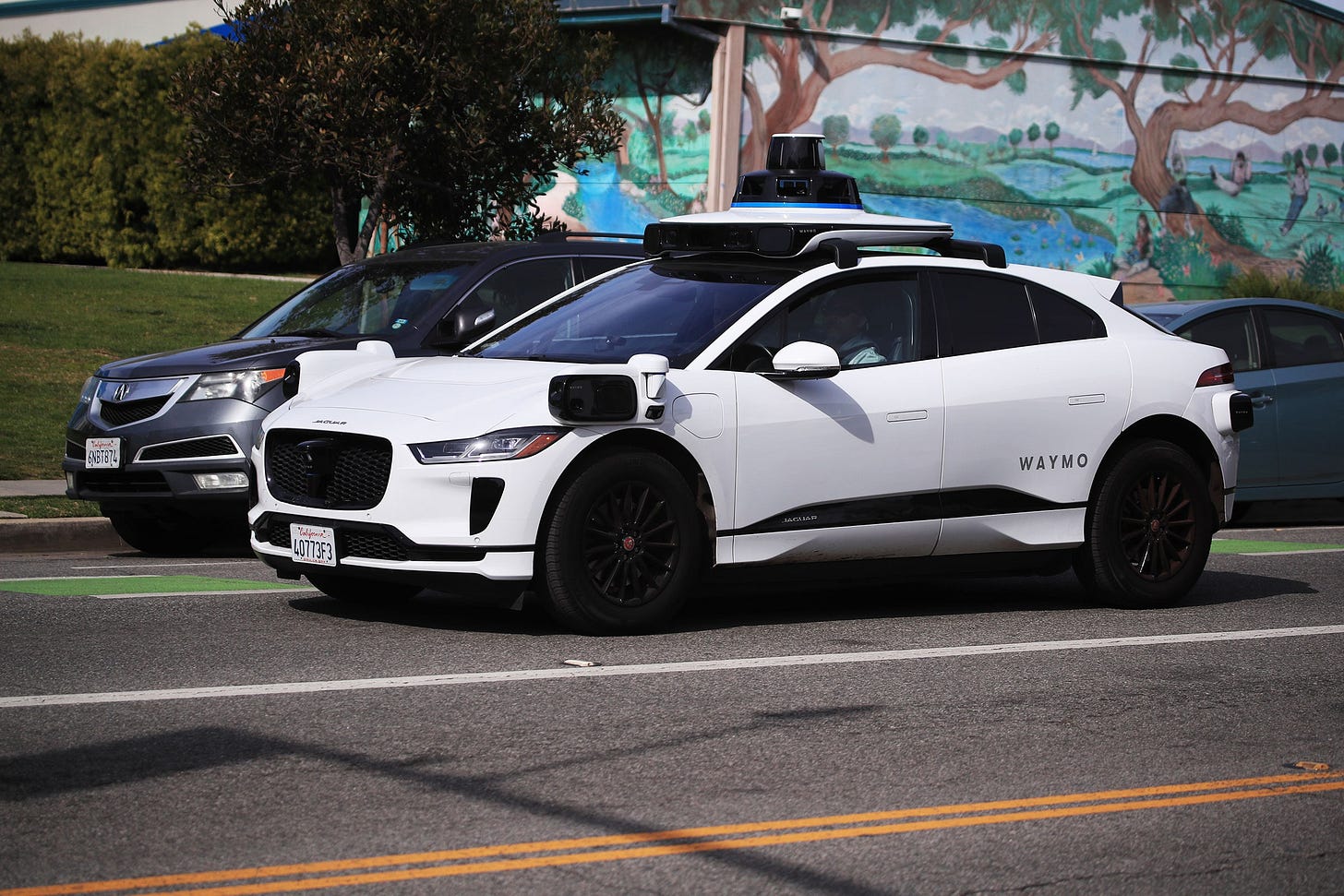Welcome back to Forests Over Trees, your weekly tech strategy newsletter. It’s time to zoom-out, connect dots, and (try to) predict the future.

Who takes the self-driving cake?
It’s rare to have a consumer experience that changes the way you see the world. It first happened to me when I was 10, falling in love with the Harry Potter books (and becoming convinced I would find out I was a wizard!). I began to see reading as form of adventure, and started to notice the bizarre things most muggles do…
A few weeks ago, I had a similarly magical, mindset-shifting experience when I took my first ride in a robotaxi.
I shared some first impressions right after that first Waymo ride , but today I want to take off my fanboy hat and put my strategist hat back on… because we have an important question to consider – which companies are most likely to “win” if self-driving takes off?
Meet the Players
The way I see it, there are three types of players worth taking odds on.
Rideshare Companies (ie. Uber)
Self-driving Companies (ie. Waymo)
Car Companies (ie. Chevy)
Let’s try to do an apples-to-apples comparison with a common set of evaluation criteria.
We’ll start with a basic one…
Who has riders?
Rider demand will be really important. And for now, Car Co’s are dominating, with 87% of US Households having access to one (down from 92% in 2019) according to Statista. Rideshare co’s are doing well too (ex. Uber with 150M monthly users globally).
But the self-driving companies are basically still in test mode right now. Waymo is only in 4 cities in the US, and even there they are leaning on waitlists given the low number of cars in service…
Who has moats?
Rideshare companies help do match-making. Self-driving companies create AI drivers. And car companies manufacture the driving machines.
To state the very obvious, these are all different skills. But the winner will probably become good at more than one of them, so having moats and being difficult to copy becomes important.
Manufacturing is likely the most time-consuming and difficult to perfect. Major new car companies are not launched very often, and for good reason. It’s hard to get to scaled manufacturing and at a high enough quality bar to appease people (cough, Tesla!).
AI for self-driving is probably the next most difficult to perfect. It’s essentially a difficult software problem with some unknowns (and some regulatory tangles to navigate), but seeing Waymo solving it will give others the confidence to try. It should be quicker to crack this problem than to scale-up a vehicle manufacturing supply chain.
Last, and likely the easiest to copy, is a realtime match-making app (matching riders and drivers). This is a software problem that has been solved for years and is moreso in optimization mode for the industry leaders (how to get wait times down, how to give riders more options/price-points, etc.).
So the final question worth considering is this.
If self-driving takes off, how does that affect their business models?
When Uber is finally able to realize founder Travis Kalanick’s cutthroat dream of getting rid of the guy in the front seat, costs will go down, and getting from point A to B via rideshare will be even cheaper and more convenient. Maybe Uber will decide to manage their fleet directly, or maybe they’ll engage the equivalent of Airbnb Superhosts to do it for them, but either way, it’s only a small tweak to their current model and should boost their margins.
For Waymo, self-driving taking off means they probably become a household name, but there’s zero impact to their business model.
For the Chevy’s of the world, I think an Airbnb comparison is helpful….
In neighborhoods where Airbnb’s are popular, home prices go up and housing supply gets constricted, meaning fewer consumers become homeowners… the ability to cheaply/conveniently “rent” a thing makes you less likely to buy it.
I think we’ll see the same dynamic with car ownership when self-driving is more prevalent.
With fewer cars on the road (but each of them more utilized), it’s easier to get to a meaningful scale as an upstart car co (shallower moats). With fewer individual owners, the lofty margins car co’s get on new car sales and servicing will get eroded. The levers of the business will stay similar, but the economics become harder.
Wrapping Up
So where does that leave us? Who should we expect to “win”?
At a high level, I think self-driving goes from being an intractable problem only the best can solve, to a small piece of software the car-makers weave into their systems. And I think those self-driving machines become commodities. But for the rideshare companies that start out with a ton of demand, they “win” and capture more value because they’re closer to consumers. To get to a self-driving car, I’m betting you’ll open your favorite rideshare app, not your garage door.
Will be fun to see how it plays out!
Bonus Bullets
Quote of the Week
“And when you have something like a pandemic, or the great recession of 2008, and 2009, and things there, or even earlier, the dot-com implosion recessions, the early part of this century, you always have these issues of, will [travel] come back? And it always does. And that’s the great thing. So, I know there are going to be some soft times, there are going to be some great times.”
— Glenn Fogel, Booking CEO, from a great Decoder interview
Quick News Reactions
Roku Sports – Not to be left-out, and in keeping with my passion project around streamers getting into sports, Roku just announced a free 24/7 sports channel! Unreal.
Another copycat – Disney will begin cracking down on password sharing later this year. This is modeled after what Neftlix did, but Netflix built a free tier first… I’m surprised to see Disney doing something similar without a free place for users to land.
FOMO Bait – In case you weren’t already experiencing enough market FOMO, here’s a fun story – Intel was in talks to buy 15% of OpenAI in 2017 for $1B. It’s like a bitcoin hipster telling you they knew about it first but decided not to buy. Cool, but not cool, all at the same time.



